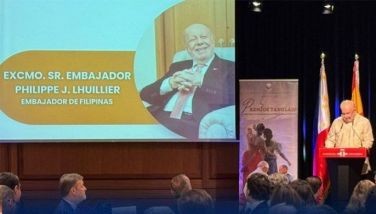High respect for human rights beneficial to businesses
MANILA, Philippines — A country’s high respect for human rights is seen to be beneficial for the business sector as it is a factor that some investors consider in doing business in a country, according to the European Union (EU) ambassador to the Philippines.
In a recent symposium organized by the Delegation of the European Union in the Philippines in coordination with the University of Asia and the Pacific, EU ambassador to the Philippines Luc Veron, emphasized the large responsibility of the corporate sector in the area of human rights, noting that respect of human rights can also bring opportunities for businesses.
”Sometimes we hear that human rights advocacy would stand in the way of trade and investment. Nothing could be more wrong. I have met many investors who confided that poor governance and sub-par access to justice, a context in which individual and collective rights are ignored or insufficiently protected, is one of the most powerful business inhibitors. In other words, human rights is good for business, “Veron said.
”In our age of transparency and people power, there is clear reputational benefit for companies who abide by high international human rights and environmental standards. For most companies, if not all, brand value is among their most important assets, and human rights violations could strongly damage that value,” he said.
The symposium highlighted that countries with a higher degree of respect have higher and more sustainable economic growth rates and higher levels of human development.
It also emphasized the role of governments and civil society, business in promoting human rights and highlighted the United Nations (UN) Guiding Principles on Business and Human Rights, which stress that not only states have the duty to protect human rights, but companies also have the responsibility to respect them, including in their global supply chains.
The EU has expressed support for the said guiding principles issued in 2011.
“Nowadays a company that tolerates human rights violations in its operations, whose business model even relies on, for example, forced labor, is not a sustainable business. Also in the economic sense, it has no business case, said “ Minister Counsellor and head of the Trade Section at the EU Delegation to the Philippines Philipp Dupuis.
Dupuis discussed EU policies and initiatives on business and human rights.
He stressed the need for companies to exercise human rights due diligence to identify, prevent, mitigate and address human rights risks in their own operations or in their supply chain.
“Human rights due diligence obligations in recent EU legal initiatives apply to European companies. However, they can have an indirect effect on operators abroad because EU importers will have to exercise the obligation down their supply chain,”Dupuis said.
He said that human rights are also part of the wider EU foreign policy through its trade initiatives.
Dupuis explained that the trade and sustainable development chapters of EU Free Trade Agreements contain commitments to ratify and implement the core international labor organization (ILO) conventions and to promote responsible business practices.
Meanwhile, UN Resident Coordinator’s Office Senior Human Rights Adviser Signe Elneff Poulsen shared that the UN Working Group on Business and Human Rights is implementing a UN Guiding Principles 10+Project to take a deeper look at the progress so far, and to prepare a roadmap for the next decade for states and business.
”With the initiative to develop a national action plan, the Philippines is uniquely placed to contribute to and benefit from such a roadmap. The adoption of a National Action Plan for Business and Human Rights in the Philippines will be a critical milestone,” Poulsen said.
”Only through joint action by all - including the United Nations, governments, human rights defenders, labour unions and other civil society actors – and by leveraging the influence of business committed to advancing human rights – do we have the best chance at tackling urgent global challenges and achieving a more sustainable future for all, she said.
For her part, Commission on Human Rights (CHR) executive director Jacqueline de Guia called on all sectors to align with the vision of the Commission.
”I hope that you join us in our vision that CSR (Corporate Social Responsibility) should not be mere philanthropy,” de Guia said, calling for more self-regulation and climate action.
”The CHR, as the premier and independent National Human Rights Institution of the Philippines, is your partner in advancing Business and Human rights in the country. The different government instrumentalities, civil society organizations, the private sector, and the academe are also our collaborators to further strengthen the advocacy on the responsible business conduct and operationalization of the UN Guiding Principles on Business and Human Rights in the country. Only when we work together and share our learnings across our sectors can we move forward”, she said.
- Latest
- Trending

























